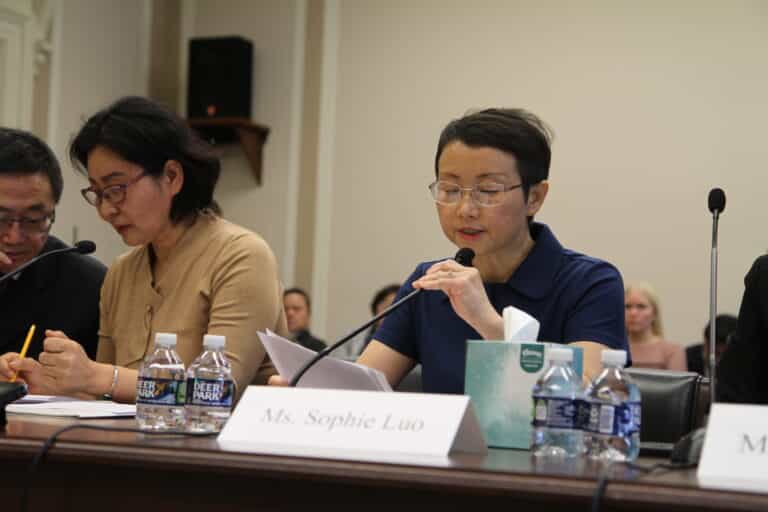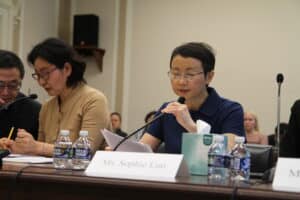(Beijing – March 26, 2024) Several wives of incarcerated human rights activists in China have revealed that they have been able to contact their husbands, some having obtained visitation rights or phone calls, but their husbands’ right of correspondence is not fully protected. They are publicly calling for attention to be paid to their husbands’ situation.
Article 47 of the “Prison Law” of the People’s Republic of China stipulates that prisoners have the right of correspondence “a prisoner may, during the service of his sentence, correspond with others, but their correspondence shall be examined by the prison. If the prison discovers that the contents of a letter present a hindrance to the reform of the prisoner, the prison may detain the letter. Letters from a prisoner to the higher authorities of the prison or to the judicial organs shall be free from examination.” Rule 37 of the Standard Minimum Rules for the Treatment of Prisoners adopted by the First United Nations Congress on the Prevention of Crime and the Treatment of Offenders states that “Prisoners shall be allowed under necessary supervision to communicate with their family and reputable friends at regular intervals, both by correspondence and by receiving visits.” In Chinese prisons, relatives of detainees can apply for a “family phone card” to allow detainees to communicate with their families. However, the right of correspondence of political dissenters is often not protected, and the principle of non-discrimination in the minimum standard of treatment for detainees is not respected.
Wang Zang
Currently, Wang Li, the wife of dissident poet Wang Zang who is serving his sentence in Yunnan Prison, received a phone call from her husband on March 11. Wang Li said, “A sense of relief overcame me! During this time, I either couldn’t sleep or woke up from nightmares! I kept dreaming that Wang Zang was sick!” “Wang Zang said that he had lost two kilograms recently! He did not receive the letter I wrote to him at the end of last year or the postcards sent by friends!”
Wang Zang was actively involved in rights defense and democratic movements before his imprisonment, calling for a reassessment of the “June 4th, 1989” student protest movement by the authorities. He also supported the Umbrella Movement in Hong Kong and the anti-extradition protests. In 2020, he and his wife, Wang Li, were arrested and sentenced to four and two years respectively. Wang Li was released on December 16, 2022. Wang Zang is expected to be released on May 30 this year.
Ding Jiaxi
Ms. Sophie Luo Shengchun, the wife of Ding Jiaxi, an activist of the New Citizens’ Movement in China, reported on March 12 that she had spoken with Section Chief Xin of the Political and Educational Section of the Jiangbei Prison in Hubei for nearly 20 minutes. She learned that Ding Jiaxi had written her a letter on February 21, but it was returned to him for revision after review. Section Chief Xin stated that the department has received Ding Jiaxi’s revised letter and is currently conducting a second review.
Previously, Sophie Luo Shengchun, who resides in the United States, had her letter sent to Ding Jiaxi through friends in China; it was received by the Prison Administration Department. Section Chief Xin said, “It will be delivered to Ding Jiaxi soon.” Sohpie Luo Shengchun thanked her friends for fighting for Ding Jiaxi’s right to communicate with her.
Ding Jiaxi and his colleague Xu Zhiyong have long been suppressed by the Chinese government for promoting democracy and the rule of law in China. They were sentenced to 12 and 14 years in prison respectively for “subverting state power” on April 10, 2023. The two attended a private gathering in coastal city Xiamen, in December 2019 to discuss the future of China’s civil society. Another participant in the Xiamen gathering, lawyer Chang Weiping, was sentenced to three and a half years in prison on June 8 on a similar charge.
Wang Aizhong
Wang Aizhong, another prominent Southern Street Movement leader and Guangzhou dissident, was sentenced to three years in prison on charges of “picking quarrels and provoking trouble.” After learning about Wang Li’s communication with Wang Zang, Wang Aizhong’s wife, Wang Henan, said “Aizhong’s situation is the same. Many postcards sent by friends to him have not been received.” Wang Henan, originally a flight attendant, has to now stay at home to take care of their children due to her husband Aizhong’s imprisonment. She now faces unemployment and will no longer be able to work as a flight attendant. Aizhong is expected to be released in May this year.

